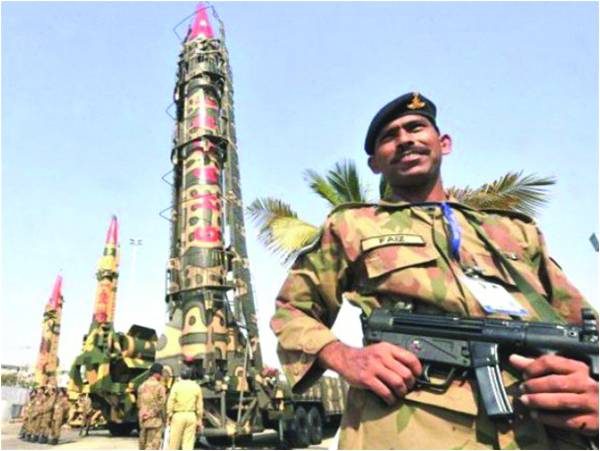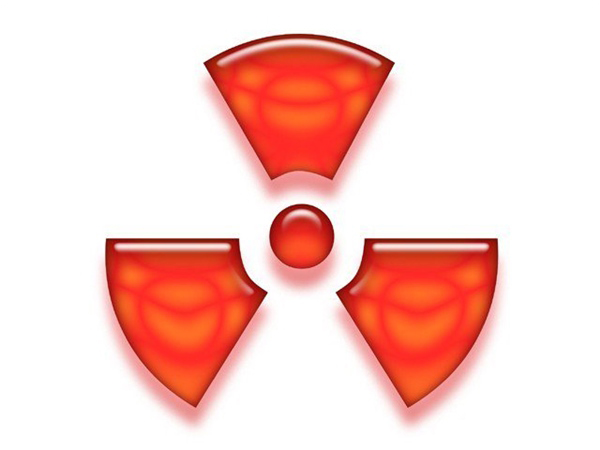
All things nuclear were discussed between Pakistan and the US earlier this month when the seventh round of bilateral talks on security, strategic stability and non proliferation took place in Washington. The occasion helped Pakistan address the suspicions that the western world has about its nuclear program. It also elicited a better understanding of its “genuine security concerns.”
The usual expected points about Pakistan’s nuclear safety, security, stability, capability, and ambitions were tabled. The US side was chaired by Undersecretary of State for Arms Control and International Security, Rose Gottemoeller. Foreign Secretary Aizaz Ahmed Chaudhry, who was leading the delegation from Pakistan’s side, defended the country’s “commitment to Credible Minimum Deterrence and to pursue measures in the region aimed at building confidence and lessening the risk of armed conflict.”
The United States in return expressed full confidence in Pakistan’s indigenous efforts to strengthen nuclear security, and welcomed the country’s efforts to strengthen export controls and border security including thorough ongoing efforts for installation of radiation portal monitors at border crossings, as well as its hosting of IAEA training activities at its Nuclear Security center.
The unusual and unexpected outcome, however, was the release of the joint statement which was quite comprehensive. It touched upon most of the controversial issues, and highlighted obvious differences which were hardly made public before.
The US underscored its continued efforts to realize the agenda set forth in President Obama’s 2009 Prague speech, including the importance of commencing negotiations of a Fissile Material Cutoff Treaty (FMCT) in the Conference on Disarmament. Pakistan underlined its preference for a broader Fissile Material Treaty (FMT) that addresses the asymmetries in existing stocks. It stressed that Pakistan’s position on FMT will be determined by its national security interests and the objectives of strategic stability in South Asia. The Foreign Secretary had already stated that Pakistan “has not and will not sign nuclear Non-Proliferation Treaty. It also believes that FMCT is discriminatory.”
“Pakistan’s decision on NPT and CTBT accords are tied to India,” said Moeed Yusuf, who is the director of the South Asia program at the US Institute of Peace. He added that Pakistan’s nuclear asset is growing fast just out of fear. “They’re thinking, the bigger the stockpile the harder it is to take out its program.”
In the meeting, the United States also outlined its nuclear stockpile reductions, explained its efforts to seek congressional approval to ratify the Comprehensive Nuclear-Test-Ban Treaty (CTBT), and reaffirmed its commitment not to conduct further nuclear test explosions. Pakistan, on the other hand, noted its continued support for CTBT-related resolutions in the United Nations General Assembly, and its consistent stance that it will not be the first in its region to resume nuclear testing.
According to Aizaz Chaudhry, “It is actually the US that shifted the balance in the region by signing civil nuclear deal with India.” He emphasized that Pakistan wishes a similar deal because it desperately needs the technology to apply in various fields including agriculture, medicine and as a useful source of energy.
The Pakistani delegation pushed for its ‘right to join the all exclusive Nuclear Suppliers Group.’
“As a responsible state, we comply with our obligations, and we believe that Pakistan has taken all possible measures to ensure the basic objective of the 1540 committee,” Aizaz said, explaining that the objective of the committee was to make sure that effective steps are taken to stop nuclear terrorism. He said Pakistan has impeccable methods to in nuclear security and participates in nuclear summit process.

The US side seemed unmoved. They’ve got deep concerns.
These concerns about Pakistan’s nuclear security and safety will stay because of two main reasons, according to Moeed Yusuf. “First, it’s hard to forget the AQ Khan incident no matter how hard Pakistan has tried to reposition itself. Second, the ongoing terrorist activities. If the country can’t safeguard its cities and its people, how can it safeguard its nuclear assets?”
The carefully drafted statement revealed that the delegations also discussed international efforts aimed at improving nuclear security with a central role of IAEA including through the high level focus by the Nuclear Security Summit process and the Global Initiative to Combat Nuclear Terrorism. In this context, both countries expressed their desire to see the 2016 Nuclear Security Summit result in a strengthened nuclear security architecture.
Accordingly, both countries aspired to ratify the Amendment to the Convention on the Physical Protection of Nuclear Material in accordance with national laws and procedures. The delegations discussed issues related to the Chemical Weapons Convention (CWC) and the Biological Weapons Convention (BWC) and would continue such consultations.
“Pakistan as a member of the CWC, and BWC - that aims to abolish all such weapons from the world till 2025 - partners with other countries to identify such toxic chemicals and keep check on their trade or unlawful exchange as well,” Aizaz said. “We have taken a series of steps at the national level in that regard, which have been repeatedly acknowledged and appreciated by the US and the international community at large.”
The working group meeting was not destined to reach a solid decision. In the end it was decided to keep the communication lines going, which Moeed Yusuf says remains the focus for now. “Both sides are sticking to their positions. They will keep insisting on their versions but then they’re not willing to drop the communication lines either; which is a good middle way,” he said.
The usual expected points about Pakistan’s nuclear safety, security, stability, capability, and ambitions were tabled. The US side was chaired by Undersecretary of State for Arms Control and International Security, Rose Gottemoeller. Foreign Secretary Aizaz Ahmed Chaudhry, who was leading the delegation from Pakistan’s side, defended the country’s “commitment to Credible Minimum Deterrence and to pursue measures in the region aimed at building confidence and lessening the risk of armed conflict.”
The United States in return expressed full confidence in Pakistan’s indigenous efforts to strengthen nuclear security, and welcomed the country’s efforts to strengthen export controls and border security including thorough ongoing efforts for installation of radiation portal monitors at border crossings, as well as its hosting of IAEA training activities at its Nuclear Security center.
The unusual and unexpected outcome, however, was the release of the joint statement which was quite comprehensive. It touched upon most of the controversial issues, and highlighted obvious differences which were hardly made public before.
The US underscored its continued efforts to realize the agenda set forth in President Obama’s 2009 Prague speech, including the importance of commencing negotiations of a Fissile Material Cutoff Treaty (FMCT) in the Conference on Disarmament. Pakistan underlined its preference for a broader Fissile Material Treaty (FMT) that addresses the asymmetries in existing stocks. It stressed that Pakistan’s position on FMT will be determined by its national security interests and the objectives of strategic stability in South Asia. The Foreign Secretary had already stated that Pakistan “has not and will not sign nuclear Non-Proliferation Treaty. It also believes that FMCT is discriminatory.”
"The bigger the stockpile, the harder it is to take out its program"
“Pakistan’s decision on NPT and CTBT accords are tied to India,” said Moeed Yusuf, who is the director of the South Asia program at the US Institute of Peace. He added that Pakistan’s nuclear asset is growing fast just out of fear. “They’re thinking, the bigger the stockpile the harder it is to take out its program.”
In the meeting, the United States also outlined its nuclear stockpile reductions, explained its efforts to seek congressional approval to ratify the Comprehensive Nuclear-Test-Ban Treaty (CTBT), and reaffirmed its commitment not to conduct further nuclear test explosions. Pakistan, on the other hand, noted its continued support for CTBT-related resolutions in the United Nations General Assembly, and its consistent stance that it will not be the first in its region to resume nuclear testing.
According to Aizaz Chaudhry, “It is actually the US that shifted the balance in the region by signing civil nuclear deal with India.” He emphasized that Pakistan wishes a similar deal because it desperately needs the technology to apply in various fields including agriculture, medicine and as a useful source of energy.
The Pakistani delegation pushed for its ‘right to join the all exclusive Nuclear Suppliers Group.’
“As a responsible state, we comply with our obligations, and we believe that Pakistan has taken all possible measures to ensure the basic objective of the 1540 committee,” Aizaz said, explaining that the objective of the committee was to make sure that effective steps are taken to stop nuclear terrorism. He said Pakistan has impeccable methods to in nuclear security and participates in nuclear summit process.

The US side seemed unmoved. They’ve got deep concerns.
These concerns about Pakistan’s nuclear security and safety will stay because of two main reasons, according to Moeed Yusuf. “First, it’s hard to forget the AQ Khan incident no matter how hard Pakistan has tried to reposition itself. Second, the ongoing terrorist activities. If the country can’t safeguard its cities and its people, how can it safeguard its nuclear assets?”
The carefully drafted statement revealed that the delegations also discussed international efforts aimed at improving nuclear security with a central role of IAEA including through the high level focus by the Nuclear Security Summit process and the Global Initiative to Combat Nuclear Terrorism. In this context, both countries expressed their desire to see the 2016 Nuclear Security Summit result in a strengthened nuclear security architecture.
Accordingly, both countries aspired to ratify the Amendment to the Convention on the Physical Protection of Nuclear Material in accordance with national laws and procedures. The delegations discussed issues related to the Chemical Weapons Convention (CWC) and the Biological Weapons Convention (BWC) and would continue such consultations.
“Pakistan as a member of the CWC, and BWC - that aims to abolish all such weapons from the world till 2025 - partners with other countries to identify such toxic chemicals and keep check on their trade or unlawful exchange as well,” Aizaz said. “We have taken a series of steps at the national level in that regard, which have been repeatedly acknowledged and appreciated by the US and the international community at large.”
The working group meeting was not destined to reach a solid decision. In the end it was decided to keep the communication lines going, which Moeed Yusuf says remains the focus for now. “Both sides are sticking to their positions. They will keep insisting on their versions but then they’re not willing to drop the communication lines either; which is a good middle way,” he said.

